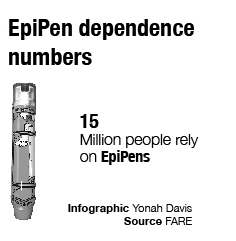EpiPens price raise costs consumers more than money
Manufacturers exploit dependents by hiking prices past reasonable costs, cause outrage
September 23, 2016
The recent price hikes in EpiPens concern my cousin, Gavin, who is severely allergic to nuts. His parents can hardly afford EpiPens. The increase in price is unnecessary and exploits consumers dependent on the drug.
Since 2007, the price of Mylan pharmaceuticals’  EpiPen has increased by 400 percent.
EpiPen has increased by 400 percent.
Epinephrine, the drug used in EpiPens, expires after one year, so EpiPens must be purchased annually.
The expiration dates make the product even less affordable to many.
Contrary to the high price in the United States, epinephrine is actually a very affordable drug, and according the New York Times, one dose normally costs as little as $1.
In most European countries, the price hasn’t changed in decades because of the drug being highly available.
The random price hike had no economical reasoning behind it. According to NBC News, Mylan CEO Heather Bresch’s pay has increased by 600 percent. Many other company leaders also doubled their own pay.
According to the Washington Post, Mylan holds a national monopoly.
Those reliant on EpiPens must either pay extensive amounts of money to obtain them, or risk death if they can’t afford them.
Fifteen million people in the United States depend on the EpiPen, according to the Federal Center for Disease Control and Prevention (CDC), as a safety net for food allergy accidents.
This number is growing partially because food allergy rates are rising.
It appears Mylan executives raised their prices only to increase their personal wealth and are exploiting dependent and defenseless people in the process.
Consumers have no other choice if they want to protect themselves and their loved ones from death.
As unethical as it is, Mylan can exploit their consumers as long as no laws are broken.
This realization has left many in outrage and some political figures have spoken up, including Hillary Clinton, who stated she will implement a system to outlaw arbitrary price hikes.
This isn’t the first time pharmaceutical giants have exploited their consumers. A study by the New York Times shows in the last decade, most drug prices have drastically increased all over the United States seemingly without reason, since in other countries they are available for far less.
According to IMS Health, an asthma inhaler costs $20 in Great Britain but costs $100 or more in the United States.
The reason the price differs so much is because in Europe governments regulate sales of these drugs.
While asthma is not necessarily deadly, and is highly treatable, these price hikes undoubtedly will negatively impact sufferers’ ability to afford treatment.
The AsthmaStats report published by the CDC in 2011 a growing number of people with active asthma who faced cost barriers to treatment.
Among children up to 17 years it was in some areas as high as 35 percent. Among adults between 18 and 64 it was almost 50 percent.
A solution is to have government control distribution and sales of lifesaving drugs, since they’re a human necessity and should not be privatized or for-profit in the first place.
This would rule out the possibility of price hikes.
This change would also prevent CEOs and company leaders from raising their own pay checks.
The government needs to change the laws in order to publicize EpiPens and other drugs rather than privatize them.
It’s unethical and dangerous to implement these price hikes because the number of people who need EpiPens and the people who won’t have access will grow, as well as the number of deaths by allergy emergencies.
The question remains whether the government will step in or let Mylan exploit millions of people.


